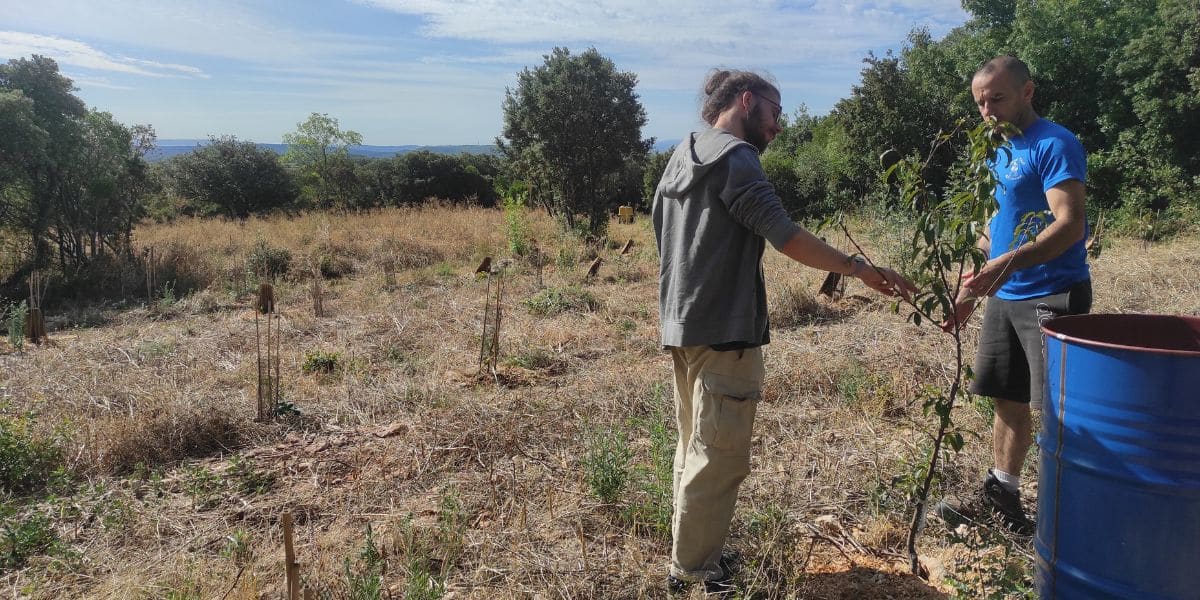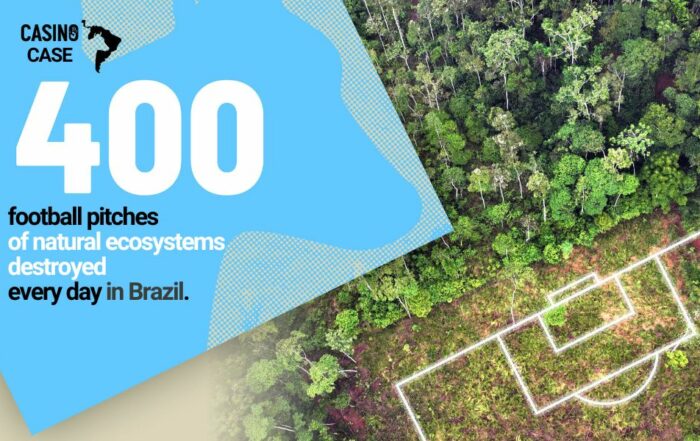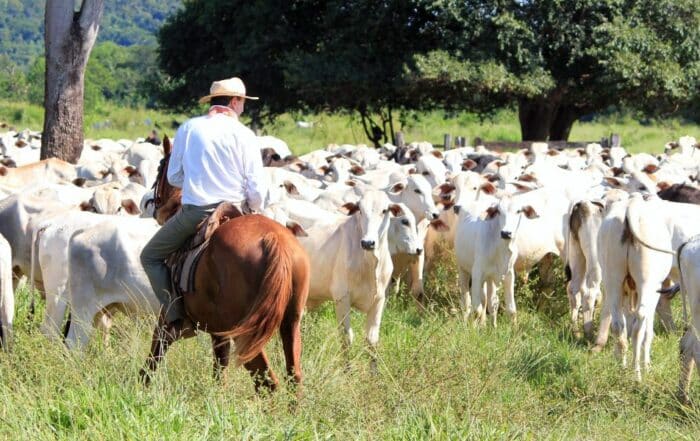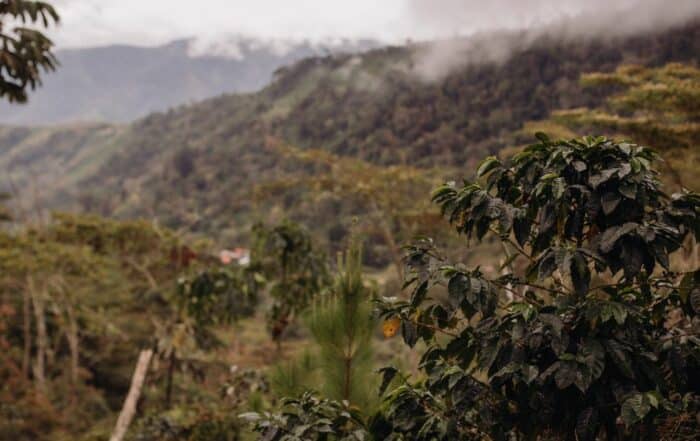The end of summer 2025 is an important stage for the 2024 group of the “Au Pré de Mes Arbres” project. After a year of support, the Envol Vert team met with participants to discuss their progress and consider the next steps. We traveled throughout the Tarn and Hérault regions to visit their agricultural parcels, answer new questions and reflect together on the prospects for the future.
The follow-up visit allows us to measure the progress made since the 2024 planting, identify successes but also the challenges that still remain : renewal of certain plaintings, adaptations to unforeseen events and even the creation of ponds.

Jehan
Our first visit was to Jehan, a passionate beekeeper who decided to plant trees to improve the living environment for his bees. On his dry, rocky land , the young plants have taken root well, although some species have encountered difficulties : peach trees died after planting and almond trees did not take root. Dogs also damaged some ash trees and mulching caused slight burns on some trunks. Despite these obstacles, the planting is beginning to structure the space, create shade and improve the resilience of the agricultural parcel. Together, we discussed the next steps, such as adding new species better suited to local conditions and protecting young plants from the sun and herbivores.
We also met up with Marina, who is developing a garden combining vegetables, aromatic plants and fruit trees. Her goal is to diversify her production and move towards greater self-sufficiency. She faces several challenges : deer can damage young stems, the August drought affected certain trees such as a chestnut tree and the loss of protective ferns has caused blueberries to suffer. To limit these impacts, Marine uses mulching and protective coverings and only waters her plants in cases of real water stress. One of her major challenges therefore remains water management : she is considering digging a pond to better retain moisture and create a favorable ecosystem.
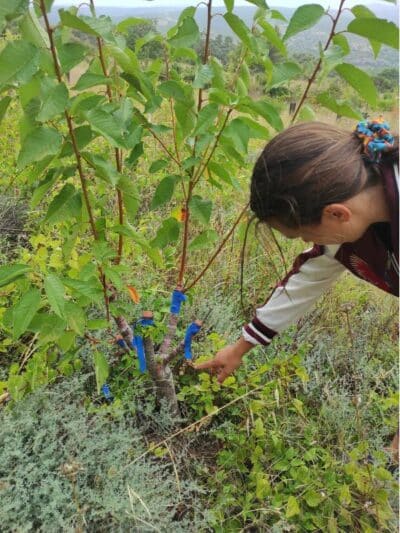
Marina
These projects perfectly illustrate the benefits of agroforestry : improving crop resilience to climate hazards, promoting biodiversity and creating spaces where plant and animal production can coexist harmoniously. Beyond the harvests, it’s an entire ecological balance and a better quality of life for farmers and their environment that is being established.
Not all visits ended on such a positive note. A combination of factors (climate hazards, lack of availability or changes within the teams) can lead to a lower rate of plantation recovery. These situations, which can sometimes be difficult for project leaders and for us, remind us that agroforestry is a long-term endeavor. They also offer valuable lessons for better anticipating and supporting future projects.
These three days were rich in exchanges and learning. Each project, whether individual or collective, demonstrates a strong commitment to more sustainable and ecosystem-friendly agriculture. Envol Vert will continue to support these farmers and project leaders, helping them to overcome their difficulties and promote their successes. From beekeeping to aquaponics, the class of 2024 illustrates the diversity and creativity needed to build resilient agricultural models. The adventure continues and the future looks promising.
The end of summer 2025 is an important stage for the 2024 group of the “Au Pré de Mes Arbres” project. After a year of support, the Envol Vert team met with participants to discuss their progress and consider the next steps. We traveled throughout the Tarn and Hérault regions to visit their agricultural parcels, answer new questions and reflect together on the prospects for the future.
The follow-up visit allows us to measure the progress made since the 2024 planting, identify successes but also the challenges that still remain : renewal of certain plaintings, adaptations to unforeseen events and even the creation of ponds.

Jehan
Our first visit was to Jehan, a passionate beekeeper who decided to plant trees to improve the living environment for his bees. On his dry, rocky land , the young plants have taken root well, although some species have encountered difficulties : peach trees died after planting and almond trees did not take root. Dogs also damaged some ash trees and mulching caused slight burns on some trunks. Despite these obstacles, the planting is beginning to structure the space, create shade and improve the resilience of the agricultural parcel. Together, we discussed the next steps, such as adding new species better suited to local conditions and protecting young plants from the sun and herbivores.
We also met up with Marina, who is developing a garden combining vegetables, aromatic plants and fruit trees. Her goal is to diversify her production and move towards greater self-sufficiency. She faces several challenges : deer can damage young stems, the August drought affected certain trees such as a chestnut tree and the loss of protective ferns has caused blueberries to suffer. To limit these impacts, Marine uses mulching and protective coverings and only waters her plants in cases of real water stress. One of her major challenges therefore remains water management : she is considering digging a pond to better retain moisture and create a favorable ecosystem.

Marina
These projects perfectly illustrate the benefits of agroforestry : improving crop resilience to climate hazards, promoting biodiversity and creating spaces where plant and animal production can coexist harmoniously. Beyond the harvests, it’s an entire ecological balance and a better quality of life for farmers and their environment that is being established.
Not all visits ended on such a positive note. A combination of factors (climate hazards, lack of availability or changes within the teams) can lead to a lower rate of plantation recovery. These situations, which can sometimes be difficult for project leaders and for us, remind us that agroforestry is a long-term endeavor. They also offer valuable lessons for better anticipating and supporting future projects.
These three days were rich in exchanges and learning. Each project, whether individual or collective, demonstrates a strong commitment to more sustainable and ecosystem-friendly agriculture. Envol Vert will continue to support these farmers and project leaders, helping them to overcome their difficulties and promote their successes. From beekeeping to aquaponics, the class of 2024 illustrates the diversity and creativity needed to build resilient agricultural models. The adventure continues and the future looks promising.

